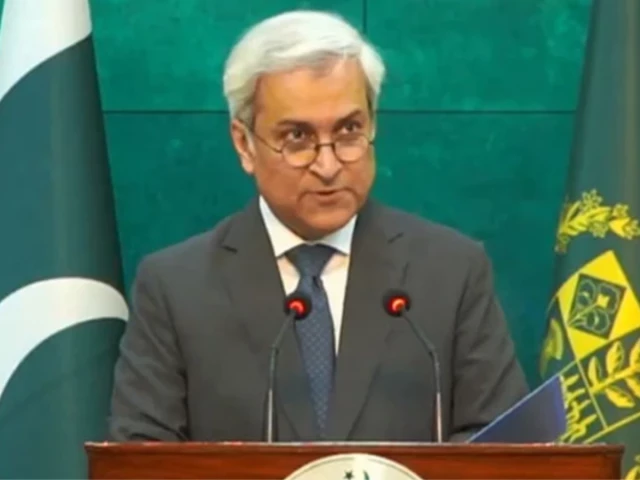‘Pakistan has been urging the Taliban to take decisive and effective measures against terrorist groups for four years’
Pakistan has stressed that it does not wish to increase tensions with Afghanistan and remains hopeful of a “positive outcome” from the next round of talks with the Afghan Taliban, scheduled to begin on November 6, Foreign Ministry spokesperson Tahir Andrabi said at a press conference on Friday.
He recalled that the second round of talks between Pakistan and the Afghan Taliban regime concluded in Istanbul yesterday afternoon, in the presence of mediators.
“Pakistan participated in the Istanbul talks, which began on October 25, in good spirit and with positive intention,” he added.
The talks were scheduled for two days. “However, in an effort to reach an amicable agreement with the Taliban regime, the Pakistani side seriously continued talks for four days.”
He stressed that Pakistan has no intention to further escalate hostilities, but “expects the Afghan Taliban regime to fulfill its commitment to the international community and address Pakistan’s legitimate security concerns by taking concrete and verifiable actions against terrorist entities, including Fitna-al-Khawarij and Fitna-al-Hindustan.”
The term Fitna-al-Khawarij is the state-designated term for the banned militant group Tehreek-i-Taliban Pakistan, while Fitna-al-Hindustan is used to describe groups based in Balochistan, highlighting the state’s accusations of India’s involvement in terrorism and efforts to destabilize Pakistan.
Andrabi said Pakistan had been urging the Afghan Taliban for the past four years to take “decisive and effective measures” against terrorist groups present on Afghan soil.
“We repeatedly shared credible information about the presence of top leaders of Fitna-al-Khawarij and Fitna-al-Hindustan on Afghan soil with the Taliban regime. However, despite repeated assurances in the past, there has been an increase in terrorist attacks in Pakistan from Afghanistan.”
He said the Afghan Taliban’s “constant and total disregard” of Pakistan’s legitimate security concerns over the past four years and the “unprovoked aggression against Pakistan supported by Fitna-al-Khawarij on October 11 and 12 and subsequently on October 14 and 15 led to violent exchanges across the international border.”
“Pakistan responded decisively to the Afghan provocation aimed at destabilizing the border area, facilitating terrorism and promoting the nefarious designs of Fitna-al-Khawarij.” Pakistan will respond resolutely if provocations continue in future, he further warned.
The spokesperson reaffirmed that “the government and the armed forces are ready to take all possible measures to protect the sovereignty of Pakistan and ensure the safety of its people.”
The spokesperson went into details about Prime Minister Shehbaz Sharif’s most recent visit to Saudi Arabia with a high-level delegation to attend the Future Investment Initiative conference in Riyadh.
During the visit, the Prime Minister met Saudi Crown Prince Mohammed bin Salman, while Deputy Prime Minister Ishaq Dar held important talks with the Saudi Defense Minister.
The delegation also held telephone conversations with foreign ministers of several countries, covering bilateral issues and investment opportunities.
Tensions between Pakistan and Afghanistan
Pakistan and Afghanistan agreed to an immediate ceasefire during talks in Doha, both sides said on October 19, after a week of fierce border clashes, the worst violence between the South Asian neighbors since the Taliban seized power in Kabul in 2021.
The two countries met again in Istanbul on October 25 to address “detailed issues.” However, Pakistan-Afghanistan talks in Istanbul failed to make any progress on Islamabad’s key demand for a clear action plan to dismantle terrorist infrastructure operating from Afghan soil.
Read more: Pakistan agrees to resume talks with Afghan Taliban at host’s request
Radio Pakistan confirmed on Thursday that Pakistan has agreed to resume negotiations with the Afghan Taliban at the request of the host countries, a move that will keep the Pakistani delegation in Istanbul longer than expected.
The decision was taken to give another chance to the negotiation process, but Pakistan’s core demand – that Afghan territory should not be used to carry out terrorism against Pakistan – will remain central to any renewed discussions.




